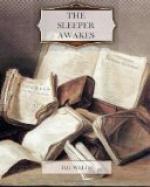“I suppose they are,” said Graham. “I suppose they are.” He mused. “This world of yours has been full of surprises to me. In the old days we dreamt of a wonderful democratic life, of a time when all men would be equal and happy.”
Ostrog looked at him steadfastly. “The day of democracy is past,” he said. “Past for ever. That day began with the bowmen of Crecy, it ended when marching infantry, when common men in masses ceased to win the battles of the world, when costly cannon, great ironclads, and strategic railways became the means of power. To-day is the day of wealth. Wealth now is power as it never was power before—it commands earth and sea and sky. All power is for those who can handle wealth. On your behalf.... You must accept facts, and these are facts. The world for the Crowd! The Crowd as Ruler! Even in your days that creed had been tried and condemned. To-day it has only one believer—a multiplex, silly one—the man in the Crowd.”
Graham did not answer immediately. He stood lost in sombre preoccupations.
“No,” said Ostrog. “The day of the common man is past. On the open countryside one man is as good as another, or nearly as good. The earlier aristocracy had a precarious tenure of strength and audacity. They were tempered—tempered. There were insurrections, duels, riots. The first real aristocracy, the first permanent aristocracy, came in with castles and armour, and vanished before the musket and bow. But this is the second aristocracy. The real one. Those days of gunpowder and democracy were only an eddy in the stream. The common man now is a helpless unit. In these days we have this great machine of the city, and an organisation complex beyond his understanding.”
“Yet,” said Graham, “there is something resists, something you are holding down—something that stirs and presses.”
“You will see,” said Ostrog, with a forced smile that would brush these difficult questions aside. “I have not roused the force to destroy myself—trust me.”
“I wonder,” said Graham.
Ostrog stared.
“Must the world go this way?” said Graham with his emotions at the speaking point. “Must it indeed go in this way? Have all our hopes been vain?”
“What do you mean?” said Ostrog. “Hopes?”
“I come from a democratic age. And I find an aristocratic tyranny!”
“Well,—but you are the chief tyrant.”
Graham shook his head.
“Well,” said Ostrog, “take the general question. It is the way that change has always travelled. Aristocracy, the prevalence of the best—the suffering and extinction of the unfit, and so to better things.”
“But aristocracy! those people I met—”
“Oh! not those!” said Ostrog. “But for the most part they go to their death. Vice and pleasure! They have no children. That sort of stuff will die out. If the world keeps to one road, that is, if there is no turning back. An easy road to excess, convenient Euthanasia for the pleasure seekers singed in the flame, that is the way to improve the race!”




